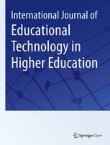Three years ago, in January 2016, we launched a new phase with a change of name for the journal and publication by Springer Nature. Our goal was to position the journal as a leading light for scholarly publications in the field of educational technology in higher education. Since then, we have published 128 articles in the International Journal of Educational Technology in Higher Education and achieved the goals we set ourselves: the journal has proven itself to be a benchmark in its field, guaranteeing academic rigour in the articles it publishes and quality throughout the editorial process.
We would like to take this chance to go over some of the actions we have carried out in order to meet these challenges and continue to improve our standing.
Renewal of the publishing agreement with Springer Nature
A new three-year (2019–2021) agreement has been signed by the Universitat Oberta de Catalunya (UOC), the legal owner of the journal, and Springer Nature. We are pleased with the relationship we have developed over the last three years, and with the value provided by the prestigious Springer Nature publishing group. Our contributing authors are extremely satisfied with the editorial processes and the journal's visibility. The international impact has increased significantly over the last three years.
Two more partner universities
Since January 2016, the journal has been produced jointly by the UOC and Colombia's Universidad de los Andes. We have worked together to assure the academic rigour of the journal, to oversee the peer review process and thematic series. In addition, we have guaranteed the sustainability of the journal with annual funding from the two universities. In order to continue to assure both the financial sustainability and academic quality of the journal, from January 2019, two more universities will be joining forces with us: Ireland's Dublin City University (DCU) and Lithuania's Vytautas Magnus University (VMU). Both these prestigious universities conduct research in educational technology. ETHE's two co-editors-in-chief, Álvaro Galvis and Josep M. Duart, will be joined by two more co-editors-in-chief from 2019: Prof. Airina Volungevičienė, from VMU, and Prof. Mairéad Nic Giolla Mhichíl, from DCU.
International Advisory Board
In 2018, the journal established an International Advisory Board to support the editors. The board has eleven members from nine countries across all continents. Its members are leading researchers in the field of educational technology in higher education who also act as ambassadors for the journal around the world. They provide rigorous analysis of the journal's evolution, as well as consulting on and monitoring its editorial line. You can see who is on the board from the following link: https://educationaltechnologyjournal.springeropen.com/advisoryboard.
Indexing in the Social Sciences Citation Index (SSCI)
The journal has increased its impact and indexing over the last three years. A month ago, we were informed that the journal has been accepted for indexing in the SSCI, and that articles since 2016 have been indexed. The journal will receive its first Impact Factor (IF) in June 2019. This is excellent news for the journal, as is its rise in other indexes, such as Web of Science or Scopus, over the last year. In the case of Scopus, we have gone from a CiteScore of 1.32 in 2017, which corresponds to Q1 in Education and Q2 in Computer Sciences, to a provisional CiteScore of 2.11 in December 2018. This leads us to believe that we will soon significantly improve the journal's position in Scopus and its indexes (SNIP, SJR and CiteScore).
We wish to thank the reviewers and thematic series editors, without whose rigorous and objective work the journal's increased impact would not have been possible.
International impact and social media presence
In 2018, the journal was able to count on 250 expert reviewers from over 50 countries, and its articles came from 116 authors in 27 different countries. This clearly positions us as an international journal in the field of educational technology in higher education.
We also continue to grow in terms of our impact and presence on social media. We end 2018 with 2,748 Twitter followers (@ETHEjournal), 441 Facebook followers (https://www.facebook.com/ETHEjournal/) and 112 followers of our Google Plus account. We hope you will continue to help us increase these numbers.
Thanks to the reviewers and the editorial team
We particularly wish to thank the over 250 reviewers for the work they have performed for the journal. Without their rigorous and objective collaboration, the journal would not have achieved the levels of impact and academic recognition it currently enjoys.
Special thanks go to the editorial team, particularly Managing Editor, Elsa Corominas, and Journal Development Editor at Springer Nature, Gregory Thoma, for their dedication. Their contribution is much appreciated by the authors, who have gone on the record to say how happy they are with the entire editorial process.
Thanks also to all our authors, followers and readers for the trust you place in us.
Happy New Year 2019!
Josep M. Duart
Alvaro Galvis
Mairéad Nic Giolla Mhichíl
Airina Volungevičienė
